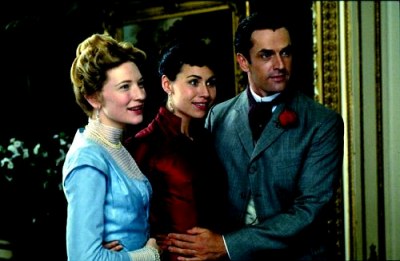




|
5 out of 10 |
 |
|
Few people overseas are aware of the devastating impact that the National Lottery has had on the British way of life. As housewives part with their small change for Bingo tickets at the end of an afternoon`s shopping, so charities like "Guide Dogs for the Blind" and small businesses like cake shops have seen their income plummet. Having done more damage to our culture than the barbarian hordes and the Third Reich put together, an embarrassed National Lottery, now sitting on the wealth of the nation, piled up into one great mound, has tried to spend its fortune on anything of cultural value, including some worthless old letters of WInston Churchill for over $50,000,000. And who on the National Lottery Board of Trustees authorised it? Why, it was his greedy grandson, Winston Churchill (younger), the very same MP who voted for the National Lottery in the first place. So when it came to the funding for turning this nineteenth century British play into a lavish costume drama film, the embarrassed National Lottery board had no problem with signing a blank cheque - which is truly ironic, as it deals with exactly the same sort of political corruption and blackmail!
The greedy and corrupt Mrs Chevely (Julienne Moore) has poured her cash in the Argentine Canal Company, a grand venture that is turning out to be a decidedly lead-bottomed investment. Unlike the Suez canal which the British Government found opened the way to the Orient, even if it is completed at great cost, it will have little or no commericial use and viaibility. To rescue herself, she turns to blackmail. With detailed knowledge of the past of fresh new MP, Sir Robert Chiltern (Jeremy Northam), she attempts to blackmail him into swinging the British Government behind the canal to rescue herself from ruin. To add to complications, she has detailed and damaging knowledge of the past of he and his friend, the lazy and faulted Lord Goring (Rupert Everett) who consequently is drawn in to the intrigue to become the central character.
Throughout, the original play and this film, there is an unseen undercurrent, for whilst the average audience are lead to believe that she is merely a woman of low moral standards who has slept with both, the scandals are never detailed, there is a duality in the meaning. For Oscar Wilde, the writer was not only an ingenious wordsmith, but was also a groundbreaking gay activist of his time, spending a long period in the notorious Reading Jail for his sexuality, and the "unmarried man" of middle age was often a byword in Victorian England for "gay". It is with fine irony that the spirit of the original play has been carried forward with Lord Goring being played by Rupert Everett, an actor who is openly gay.
The central issue of whether to bow to pressure and start the journey down the road to hell or to refuse to be corrupt and face to loss of all is as old as politics itself - "to be or not to be" as Shakespeare put it - and is handled here in a thought provoking way. Even so, its comedy, however well it is done by this glittering cast, is still often dependant on the inopportune arrival and departure, a theatrical plot device that has grow stale over the last century and it remains a play out of its time.
Film Critic:
Robert L. Thompsett |
|